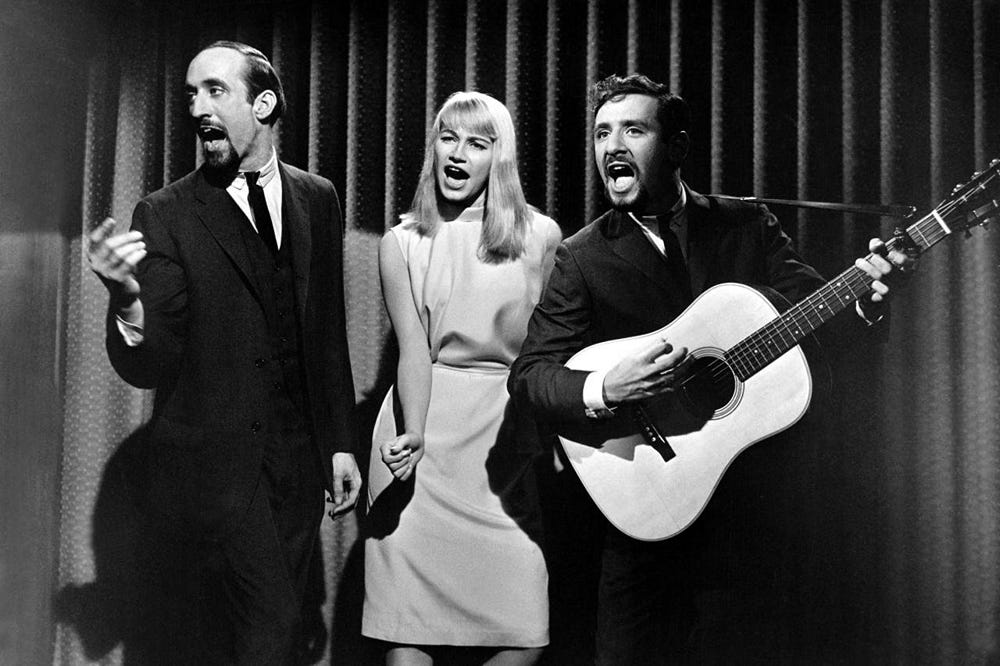May 11 - How "Puff (The Magic Dragon)" Transformed Into a Timeless Treasure
The Lasting Echoes of Our Words
This is the day "Puff (The Magic Dragon)" single by Peter, Paul & Mary peaked at #2 on the charts in 1963.
In today's lesson, we will explore how a forgotten poem transformed into a beloved song carries profound spiritual truth about the power of our words. How do the words you speak impact others long after they're uttered? What would change if you viewed each conversation as holding the potential for lasting transformation?
"Do not let any unwholesome talk come out of your mouths, but only what is helpful for building others up according to their needs, that it may benefit those who listen." - Ephesians 4:29 (NIV)
This Date in History
Peter Yarrow stared at the crumpled piece of paper left behind in his typewriter. His Cornell University classmate Lenny Lipton had just departed Yarrow's apartment, leaving behind what appeared to be a poem. The words captured Yarrow's imagination with their gentle narrative about childhood imagination and inevitable maturation. Immediately sensing the poem's poignancy, Yarrow began working that very evening in 1959 to set it to music.
The poem had been inspired by Lipton's sudden memory of an Ogden Nash poem about a dragon while walking to Yarrow's apartment. Upon arriving, he found Yarrow wasn't home, so he let himself in and began typing his own dragon-themed poem. When Lipton abruptly remembered another commitment, he left without retrieving his work, unaware that his forgotten words would soon be transformed.
After adapting the poem and creating a melody in 1959, Yarrow kept the song in his repertoire. It wasn't until 1961 that he had the opportunity to share it with Mary Travers and Paul Stookey when they formed the folk trio Peter, Paul & Mary. The group had come together through the New York folk scene under the guidance of manager Albert Grossman, who would later represent Bob Dylan. Grossman had assembled them specifically to capitalize on the growing folk revival movement. The trio's tight harmonies and accessible approach to folk music quickly began to resonate with American audiences seeking authenticity amid rapid cultural changes.
The song "Puff (The Magic Dragon)" was first recorded for their self-titled debut album in 1962. The recording featured Yarrow's tender vocals backed by the group's signature harmonies, supported by simple acoustic guitar. The arrangement deliberately maintained the childlike innocence of the narrative, telling the story of a boy named Jackie Paper and his dragon friend Puff, and their adventures together until Jackie grows up and loses interest in childhood games.
Released as a single in January 1963, the song climbed steadily on the charts, reflecting its growing popularity across age groups. On May 11, 1963, it reached its peak position at #2 on the Billboard Hot 100 chart, held from the top spot only by The Chiffons' "He's So Fine." The song's success came during a pivotal moment in American music, bridging the gap between the folk revival movement and mainstream pop acceptance.
Despite its commercial success, the song soon faced unexpected controversy when rumors began circulating that the lyrics contained hidden drug references. Yarrow vehemently denied these interpretations, insisting the song was exactly what it appeared to be: a poignant tale about childhood's end. Lipton, who had received co-writing credit after Yarrow tracked him down, similarly rejected these interpretations as absurd projections that missed the song's true meaning.
The song's enduring popularity transcended these controversies. "Puff (The Magic Dragon)" became a staple of children's music collections, performed in classrooms and campfires across America. Its gentle meditation on the inevitability of growing up resonated across generations, cementing its place in American cultural consciousness. The song's legacy continued through animated adaptations, book versions, and countless cover recordings, transforming Lipton's forgotten poem into an enduring cultural touchstone about the bittersweet transition from childhood innocence to adulthood.
Historical Context
The early 1960s represented a critical period of transition in American music and culture. The folk revival movement had gained significant momentum by 1963, spearheaded by artists like Joan Baez, Bob Dylan, and Peter, Paul & Mary who brought traditional folk songs and original compositions with meaningful lyrics to mainstream audiences. This musical movement coincided with growing social consciousness as the civil rights movement intensified and youth culture began questioning established norms.
The commercial success of "Puff (The Magic Dragon)" came at a moment when American society was still maintaining much of its post-war optimism while the first tremors of the cultural revolution were beginning to be felt. The Kennedy administration's "Camelot" era projected youthful energy and idealism, while simultaneously facing the tensions of the Cold War and civil rights struggles. Many Americans embraced folk music's authenticity as an antidote to the perceived artificiality of commercial pop music, seeking deeper meaning during a time of rapid social change and growing awareness of societal inequities.
Did You Know?
Peter Yarrow credits Leonard Lipton as the song's co-writer and ensured he received royalties, which helped fund Lipton's later career as a pioneer in stereoscopic filmmaking and 3D cinema technology.
The island of "Honalee" mentioned in the song doesn't exist on any real map, but was created specifically for the narrative, combining elements that sounded both exotic and whimsical to American ears.
Before joining Peter, Paul & Mary, Mary Travers had sung backup vocals for folk legends like Pete Seeger and had been involved in the Greenwich Village folk scene since her teenage years.
Peter Yarrow co-founded the nonprofit organization Operation Respect in 1999, which uses "Puff (The Magic Dragon)" and other music to promote tolerance and reduce bullying in schools worldwide.
Though often assumed to be written specifically for children, both Yarrow and Lipton have stated the song was always intended as a bittersweet reflection on the loss of childhood innocence, aimed at adults who could appreciate its deeper message.
Today’s Reflection
A forgotten poem left in a typewriter became one of the most beloved songs about childhood's fleeting wonder. When Peter Yarrow discovered Lenny Lipton's spontaneous verses, he saw potential where others might have seen only discarded scribbles. That moment reminds us of something deeper: the words we leave behind, even unintentionally, may echo louder and longer than we imagine.
"Do not let any unwholesome talk come out of your mouths, but only what is helpful for building others up… that it may benefit those who listen." Ephesians 4:29
Have you paused lately to consider the lasting echo of your words?
Lipton never meant for his lines to travel far. Yet once joined to melody and shared with the world, they carried a blend of innocence and ache that has lingered for generations. Our words, too, can travel beyond our reach. They shape hearts, stir memories, and sometimes do more spiritual work than we ever see.
"The tongue has the power of life and death." Proverbs 18:21
This is not poetic exaggeration. It is spiritual fact.
Words can bless or break. Heal or divide. And once they leave our lips, they often take on a life of their own. The rumors and misinterpretations surrounding "Puff (The Magic Dragon)" underscore this. Lipton and Yarrow wrote a song about innocence and imagination. Others heard veiled messages they never intended. The point is not to speak less, but to speak with care.
A careless word may harm more deeply than we realize. But a word seasoned with grace can carry divine weight.
Peter Yarrow didn't hoard Lipton's poem. He brought it into community. He added music, gave it voice, and through collaboration, the forgotten became unforgettable. This is a biblical pattern. God multiplies our humble offerings through others. What seems small in our hands can become a blessing in theirs. What we say, when offered in love and unity, can grow into something far bigger—a testimony, a comfort, a call to life.
Consider how Jesus spoke. Each word was measured. Every phrase held truth, mercy, authority. When He said to the paralytic, "Your sins are forgiven," Mark 2:5, He wasn't offering comfort alone. He was revealing divine power to redeem both soul and body. Jesus was not merely a teacher with wise sayings. He is the Word made flesh—"The Word became flesh and made his dwelling among us." John 1:14
God's redemptive voice took human form.
And now, He calls us to echo that voice, to speak in ways that reflect His character, not just our opinions. To choose speech that is seasoned with salt, not sarcasm. Grace-filled, not grating. Healing, not hollow.
The sweetness of "Puff (The Magic Dragon)" lies in its tension. It acknowledges the sorrow of growing up but preserves the wonder of innocence. In that space—between grief and joy—we often find the gospel. The Christian walk, after all, is full of letting go and being made new. Dying to self. Rising in Christ. When our words hold both ache and hope, they ring true. Because they sound like the gospel.
So ask yourself: what are you speaking today?
Are your words infused with grace? Or are they shaped by frustration, fear, or pride? Jesus said, "For the mouth speaks what the heart is full of." Luke 6:45
If Christ fills our hearts, His love should season our lips.
God once said, "Let there be light." And there was.
We don't command stars into being. But we do speak into relationships, into moments, into lives. And sometimes, those small words—spoken in love, truth, or prayer—become the spark of transformation.
Choose your words prayerfully. Speak them lovingly.
Because in the hands of a faithful God, even forgotten lines can become melodies of grace.
Practical Application
Take inventory of your words today by carrying a small notepad or using your phone to record the general tone and content of your conversations. At day's end, review this record, specifically noting instances where your words built others up or tore them down. Identify one relationship that could benefit from more intentional communication and write a brief note of encouragement to that person, focusing on their strengths or expressing authentic gratitude for their impact in your life. Then commit to replacing one negative speech pattern you've identified with a constructive alternative, practicing this replacement consistently for one week while asking a trusted friend for accountability.
Closing Prayer
Gracious Father, we stand amazed at the power You've entrusted to us through our words. Forgive us for the times we've spoken carelessly, wounding others or missing opportunities to bring encouragement. Fill our hearts with Your love and truth so that our speech naturally reflects Your character.
Lord, help us become people whose words consistently build up rather than tear down. Guide us to speak with purpose, kindness, and wisdom in every conversation. May the words of our mouths and the meditations of our hearts be pleasing to You, our Rock and Redeemer. In Jesus' name, Amen.
Final Thoughts
Words carry the potential of eternity within their temporal sounds. They can become either forgotten whispers or enduring melodies that echo through generations. The difference lies not in eloquence or volume, but in whether they align with God's redemptive purposes. When we surrender our speech to His guidance, our simplest utterances gain supernatural power to heal wounds, restore hope, and reflect glory back to the One who spoke all creation into being.
THIS IS THE DAY Last Year
May 11 - 54 Knights Betrayed: The Quick Fall of the Templars
This is the day 54 members of the Knights Templar are burned at the stake as heretics in France in 1310.
Author’s Notes
Believe it or not, this is our 500th consecutive, daily post of THIS IS THE DAY. Honestly, it feels surreal. I don’t quite know how we’ve made it this far or how I’ve managed to keep finding things to say. Hopefully, it hasn’t felt too repetitive, and you’re still finding meaning and encouragement in each entry.
I’m truly thankful for every one of you—for reading, for your kind comments and likes, and for the way so many of you have shared this work with others. Your continued engagement has meant everything to me. I’m also deeply grateful to those who’ve chosen to support it through paid subscriptions and donations. Just yesterday, we welcomed seven new subscribers, including one new paid supporter. Every bit of that matters. That kind of encouragement keeps this going.
Thank you, truly. God bless you all.
P.S. Happy Mother’s Day to all the mothers reading this. Your faithfulness, strength, and love are a blessing to your families and to all of us. God sees you, honors your labor, and has entrusted you with a calling that reflects His own nurturing heart. Thank you for the countless ways you pour yourselves out in love.
This devotional is free to read. You can support this publication by becoming a subscriber, upgrading to paid subscriber status, liking (❤️) this post, commenting, and/or sharing this post with anyone who might enjoy it. You can also make a ONE-TIME DONATION in any amount. Thank you for your support!













A great reminder that our words have power.
Congrats on 500, Jason! As to nefarious undertones in 60s pop music lyrics generally, and to drug allusions, here in this song specifically, I've come to the conclusion, after mountains of research for my '60s era gospel-themed novel, "Covered With Snow," that the entire phenomenon of readily accessible poetic popular music which we now take for granted, was spiritually coopted in myriad ways, both explicit/knowing and subtle/naive in an Ephesians 6:12 long battle, to move the West, a.k.a., nominal Christendom, toward satiation with secular, worldly "worship" i.e., of anything and everything other than the purpose it is meant to serve ultimately, and which it had served, in the main, with exceptions, for millennia: worship of the one, true, living God.
The Biblical premise underneath my conclusion is based on man's inability to serve two masters (Elijah at 1Kings 18, Joshua at Joshua 24, and Jesus at Matthew 7, e.g.) Or to put it another way, there is no neutral-innocent it-was-just-a-poem I-didn't-know middle... which Bob Dylan reprised with "ya gotta serve someone".
I won't insist on that super-big-picture view, but merely toss out there. The subtle/naive version is what I suspect happened here. The writers and singers thought there was a neutral middle. But in the early '60s, even if you were knowingly trying to undermine Western Civilization, you had to do it subtly, and apologize for it if caught, whereas a few years later, the invasion was shameless.